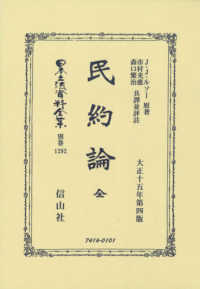基本説明
This book brings together economists, sociologists and anthropologists, addressing such issues as religion, family, ethnic ties, entrepreneurship and poverty.
Full Description
Does culture matter? This question has taken on added significance since fundamentalist revivalism has recently gained ground in different parts of the world. The old controversy between Max Weber and Karl Marx, which centres around the extent to which cultural factors such as social norms and values affect economic growth is of critical importance, particularly because of its policy implications. Indeed, if culture is not an autonomous factor susceptible to influencing economic realities, it should not matter and public authorities can dispense with thinking about cultural interventions. On the other hand, if culture does have a real impact, the question arises as to whether it is conducive or detrimental to economic growth, political liberalization, and the emancipation of individuals among other things.
Culture, Institutions, and Development addresses this debate at a concrete level by looking at five important issues: the role of tradition and its influence on development; the role of religion, with special reference to Middle Eastern countries; the role of family, kinship, and ethnic ties in the process of development; the relationship between culture and entrepreneurship; and the relationship between culture and poverty.
This collection offers a nuanced view that neither denies nor exaggerates the role of cultural factors in explaining relative growth performances across countries. Instead, the contributors focus on the dynamic, two-way relationship between culture and development in a way that stresses policy stakes and the value of multidisciplinary collaboration between economists, historians and other social scientists. This book will be of interest to postgraduates and researchers in all the social sciences, as well as to professionals working in national development agencies, international organisations, and Non-Governmental Organisations.
Contents
Part 1: Overview of issues 1. The role of culture in development: an overview Jean-Philippe Platteau 2. Culture and development: the continuing tension between modern standards and local contexts Héla Yousfi 3. Culture and development: do social struggles make a difference? Jean-François Bayart Part 2: Religion, family and ethnicity 4. Economic underdevelopment in the Middle East: the historical roles of culture, institutions, and religion Timur Kuran Comments Mona Makram Ebeid 5. Family and kinship ties in development: an economist's perspective Eliana La Ferrara 6. The demand for disadvantage Rohini Somanathan Part 3: Culture and entrepreneurship 7. Markets and the diffusion of institutional innovations Marcel Fafchamps 8. Culture, management and development Philippe d'Iribarne 9. The invention of traditions and entrepreneurship: a critical perspective Jean-Pierre Warnier Part 4: Culture and poverty reduction 10. Culture matters for poverty, but not because of a culture of poverty - Notes on analytics and policy Michael Walton Comments Stuti Khemani and Stéphanie Mahieu Part 5: Conclusion 11. Repositioning culture Jean-Philippe Platteau and Robert Peccoud








